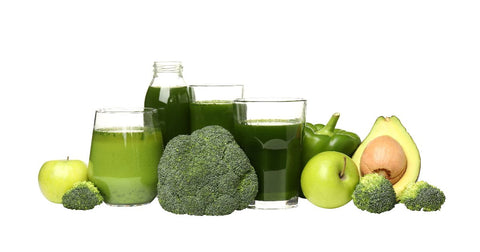Acid reflux, that fiery burning sensation in your chest, can put a serious damper on your day. While medication can offer relief, making mindful dietary choices is crucial for long-term management. But with so many delicious temptations out there, it's easy to wonder, "What are the worst foods for acid reflux?"
Let's explore ten common food culprits that can trigger or worsen your acid reflux symptoms, and how identifying potential food intolerances might help you find lasting relief.
The Top Ten Worst Foods for Acid Reflux: A Watchlist for Your Diet
1. Spicy Foods:

The capsaicin in spicy foods can irritate the esophageal lining, leading to heartburn and other reflux symptoms. While many people enjoy a bit of heat, those with acid reflux might need to temper their spice intake.
2. Fatty Foods:
High-fat foods, especially fried foods, fatty meats, and creamy sauces, take longer to digest and can linger in your stomach, increasing the risk of acid reflux. Opt for lean protein sources and healthier cooking methods like grilling or baking.
3. Citrus Fruits:
Oranges, grapefruits, lemons, and limes are highly acidic and can relax the lower esophageal sphincter, allowing stomach acid to flow back up into the esophagus. While vitamin C is important, consider less acidic fruits like berries or melons if citrus triggers your reflux.
4. Tomatoes:

Are tomatoes acidic? Yes, tomatoes and tomato-based products like pasta sauce and ketchup are acidic and can worsen acid reflux symptoms. If you notice heartburn after indulging in your favorite Italian dish, it might be time to reconsider your tomato intake.
5. Chocolate:
This beloved treat contains caffeine and fat, both known triggers for acid reflux. Additionally, chocolate contains a compound called theobromine that can relax the lower esophageal sphincter, further increasing the risk of reflux.
6. Coffee:
Is coffee bad for acid reflux? For many people, the answer is yes. Coffee, especially when consumed on an empty stomach, can stimulate acid production and irritate the esophageal lining. Opting for decaf or limiting your intake might be beneficial.
7. Alcohol:

Alcohol, especially in large amounts, can relax the lower esophageal sphincter and increase stomach acid production. It's best to enjoy alcoholic beverages in moderation or avoid them altogether if you experience frequent heartburn.
8. Carbonated Beverages:
The bubbles in carbonated drinks can expand in your stomach, creating pressure and potentially pushing stomach acid back up into the esophagus. Consider swapping soda for water or herbal tea to minimize reflux triggers.
9. Onions and Garlic:
These flavorful vegetables are often used in various cuisines, but they can also trigger heartburn in some individuals. Pay attention to your body's response after consuming these foods and adjust your intake accordingly.
10. Peppermint:

While peppermint might seem soothing, it can relax the lower esophageal sphincter, making acid reflux more likely. Opt for other herbal teas like chamomile or ginger for digestive support.
Food Intolerance and Acid Reflux: A Deeper Dive
Sometimes, even if you avoid the common trigger foods listed above, you might still experience acid reflux. This could be due to food intolerances or sensitivities, where your body has difficulty digesting certain foods, leading to inflammation and discomfort.
A food sensitivity test can help you identify specific foods that might be contributing to your acid reflux symptoms. By eliminating or reducing these triggers, you can potentially experience significant relief and improve your overall digestive health.
Key Takeaways:
- Managing acid reflux involves both lifestyle changes and dietary modifications.
- Avoiding or limiting the 10 worst foods for acid reflux can help reduce symptoms.
- Be mindful of other potential trigger foods and consider food sensitivity testing to identify personal sensitivities.
- If you experience persistent or severe acid reflux, consult a healthcare professional for further evaluation and treatment options.

Remember, this article is intended for informational purposes only and should not be considered a substitute for professional medical advice. Always consult your doctor or a registered dietitian for personalized guidance on managing your acid reflux and dietary needs.
Frequently Asked Questions:
1. I love spicy food! Do I have to avoid it completely if I have acid reflux?
Not necessarily. While spicy foods can trigger heartburn in some individuals, others might tolerate them in moderation. Experiment with different levels of spice and pay attention to your body's response. If you experience discomfort, consider reducing the heat or avoiding spicy foods altogether.
2. Are there any healthy fats I can include in my diet even if I have acid reflux?
Yes! Avocados, nuts, seeds, and olive oil are good sources of healthy fats that are less likely to trigger acid reflux compared to saturated or trans fats.
3. I have a sweet tooth. Are there any desserts I can enjoy without worsening my acid reflux?
Opt for desserts made with natural sweeteners like fruit or honey, and choose options lower in fat, such as fruit-based sorbets or yogurt parfaits.
4. Can a food sensitivity test really help with acid reflux?
Yes, a food sensitivity test can identify specific foods that might be contributing to your acid reflux symptoms, even if they aren't on the list of common trigger foods. This knowledge empowers you to make targeted dietary changes for better digestive health.
5. I've made dietary changes but still experience occasional heartburn. What else can I do?
Lifestyle modifications like eating smaller meals, avoiding eating before bedtime, and managing stress can also help. If your symptoms persist, consult a healthcare professional for further evaluation and treatment options.


.png?v=1737390083)
.png?v=1737187409)


